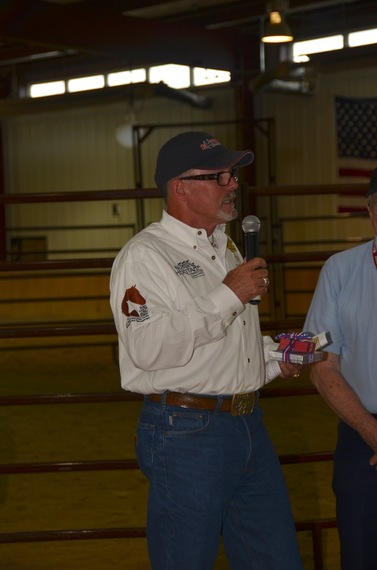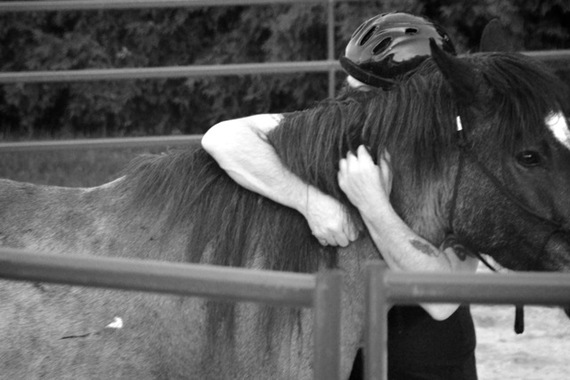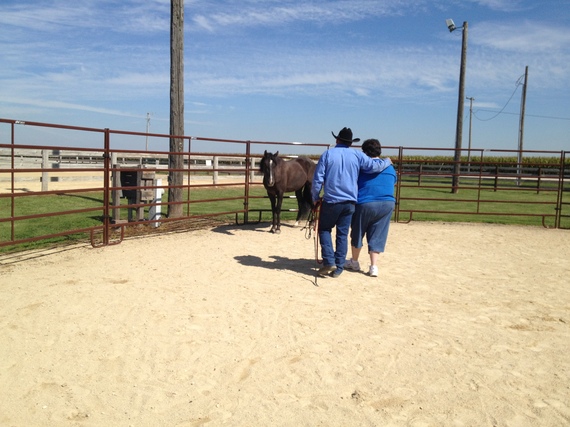Several different cultures around the world have depended on horses for thousands of years. There are many different theories that suggest horses may have begun being domesticated around 4,500-2,000 BC. Horses have been used for battle, to gather food, for comfort, and to discover new lands. For several decades in America, horses have been used as therapy for individuals with autism, cerebral palsy, individuals who have experienced trauma, post-traumatic stress disorder, traumatic brain injury, and other diagnoses.
Some of the most fascinating life changing transformations have come from veterans. I attended one of the largest gatherings of equine therapy specialists and veterans in the country, the event was called, "Providing with Purpose: Serving Veterans to the Best of our Abilities." It was hosted by the BraveHearts Therapeutic Riding & Educational Center. BraveHearts organization is one of several equine-assisted therapeutic centers in the country that offers therapeutic riding, hippotherapy and several other services with horses. BraveHearts works with a wide variety of people from children with autism to veterans diagnosed with PTSD.
At this event there was a Navy Seal, a Medal of Honor Winner, several representatives from VA hospitals, and veterans. A man named Michael Richardson was there showing how it's possible to overcome obstacles in life, he was in a wheelchair doing a demonstration with a horse, to show how gentle these animals are. I heard incredible stories of triumph and healing by brave men and women facing post-traumatic stress disorder, traumatic brain injuries, and sexual trauma.
I heard a story of a veteran that was suicidal; he slept with a gun next to his bed, only to have his life transformed, by learning to ride a horse. I heard a story of someone who reached to the veteran's suicide prevention hotline, just to have someone to talk with during her recovery. She found great recovery in learning how to ride horses.
I met Rob Foley a retired Navy Seal, who's on a mission to prevent veteran suicide all over America. He travels all around the United States as a champion for giving more veterans access to equine-assisted activities. He filmed a documentary called, "A Different Journey" that tells his story of being a Navy Seal, and being a PTSD & TBI survivor.  (Photo Credit: Tricia Carzoli)
(Photo Credit: Tricia Carzoli)
Another very brave man, Aaron Heliker a retired member of the U.S. Air Force, was there to expand awareness of horses through his new documentary called, "Riding My Way Back." The documentary takes you through Staff Sergeant Aaron Helikers journey from being deployed in Iraq and Afghanistan multiple times, to coming home to face PTSD, TBI, third-degree burns, and nerve damage. Heliker was given 42 medications when he returned home for war, according to the documentary's synopsis, he found healing in working with a horse named Fred.
Nick Montijo a retired U.S. Marine, who was injured in Afghanistan, was there teaching a course on how to become a PATH certified riding instructor as a veteran. PATH stands for the Professional Association of Therapeutic Horsemanship International; according to the website, the organization was founded in 1969 as the North American Riding for the Handicapped Association (NARHA) to help promote safe and effective horseback riding. The organization has more than 850 member centers and around 7,600 members all around the world, severing over 54,000 people. PATH also has program called "Equine Services for Hero's" which focuses on the therapeutic needs of veterans, there are over 200 internal member centers helping veterans.
Montijo was introduced to equine-assisted activities by a recommendation from the Milwaukee, VA. He loved it so much, that he went through the training to earn his Professional Association of Therapeutic Horsemanship (PATH) certificate. Now he is helping other veterans to learn how to ride horses.
On a larger scale, several military and veterans hospitals are starting to take notice. Walter Reed National Military Medical Center's has sent military personnel to partake in a program at Caisson Platoon Equine Assisted Programs; they have a program called, "Life Skills Transition Program."
One thing is clear that any and all therapies should be looked at considering 22 veterans a day are committing suicide. The sad thing is, there are very few studies dedicated to hippotherapy and therapeutic riding for veterans and individuals with PTSD, TBI, or sexual trauma. More universities and other military departments should be looking to study this.
I think, if members of congress and the senate look into equine-assisted activities for veterans, we would see a lot of positive progress. There are a few bills out there in congress looking to make equine-assisted activities more accessible to veterans. One bill called, "H.R. 1705 Rehabilitative Therapy Parity for Military Beneficiaries" is looking to provide members of the military access to equine therapy. Another bill, "H.R. 4977: COVER Act" is also looking to research the effectiveness of alternative therapies such as equine-assisted activities.
Equine-Assisted Activities for Veterans
BraveHearts Therapeutic Riding & Educational Center
www.braveheartsriding.org/veterans/veterans-programs
Caisson Platoon Equine Assisted Programs
www.cpeap.org
Rainier Therapeutic Riding
www.rtriding.org
Associations
Professional Association of Therapeutic Horsemanship International (PATH)
www.pathintl.org
Documentaries About Veterans and Horses
Riding My Way Back
www.ridingmywayback.com
A Different Journey
www.vimeo.com/68371055
I hope to one day see a program at every VA hospital that would give veterans access to equine-assisted activities. Giving veterans access to the best health care should be the highest priority. The biggest issues is raising awareness about the equine-assisted activities, I think if more people heard about some of the life transforming stories of veterans and horses these programs would be more available.
Need help? Veterans Crisis Line: 1-800-273-8255 press 1; In the U.S., call 1-800-273-8255 for the National Suicide Prevention Lifeline.


